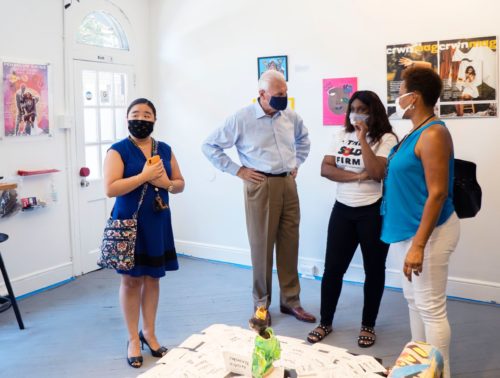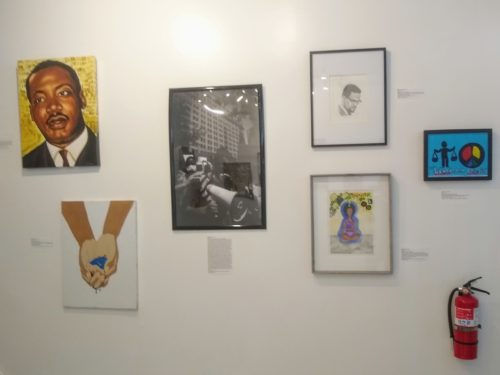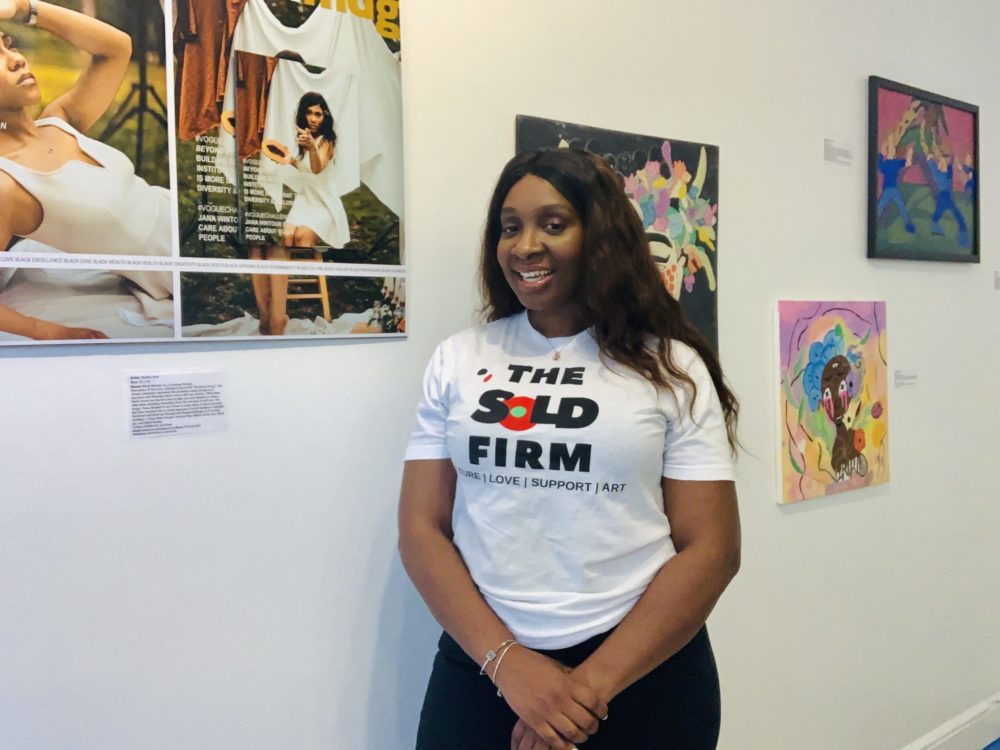
This article appears in a 12-part series on minority entrepreneurship and is underwritten by the Wilmington Alliance. It was independently reported and not reviewed by Wilmington Alliance before publication.
Wilmington art gallery The Sold Firm, tucked away on Tatnall Street in the Creative District, was make possible by three things: a strong social network, a full-time job and founder Nataki Oliver’s own will.
“In 2018 I started saying out loud that I’m going to be an art dealer and I said it multiple times,” Oliver said. “I manifested it. I thought I wasn’t going to have a physical gallery for a year or two.”
She wound up opening her first gallery, inside of Artist’s Avenue Station (AAS), the former artist co-share at her current location. AAS is owned by John Naughton, who is also one of the founders of Wilmington Green Box and Green Box Kitchen.
“I know him because my son used to have a lemonade business, and he started there” at AAS, she said. “When they reached out — him and [Green Box cofounder] Jason [Aviles] — they said, ‘We see what you’re doing, it’s positive, we like the direction, we have this space available and wanted to know, would you be interested?'”
Oliver agreed to discuss it, and by January 2019, she was setting up her own gallery within AAS and managing its social media.
Though she was thrown into her dream business seemingly overnight, Oliver knew enough about business and the arts industry to make it work. When she was a kid, she wanted to get into fashion.
“I couldn’t afford to go to college, so, when I became an adult, I moved to New York and I went to [Fashion Institute of Technology],” she said. “I graduated from FIT in ’09 with a design degree and marketing in fashion degree. Had a good job, then the recession hit, and I lost my job.”
As a mother with no job in pricey New York City, she couldn’t stay, so she returned to her hometown of Wilmington.
The fact that her son, Nasai Oliver, started his Myster Lemonade business at the age of 12 gave her some knowledge on how to start a business, too. Since he was a minor, she took the Launcher Entrepreneurship Program at West End Neighborhood House with him. He won first place in the program’s pitch competition, and sold his lemonade through Wilmington Green Box and other local businesses in addition to his space at AAS. (Nasai Oliver is now a business and finance student at Delaware State University.)
Some things, she taught herself — “that’s the beauty of Google and YouTube,” she said. It took her months, but she designed The Sold Firm website on her own. Internet research was also how she learned to run Facebook and Instagram ad campaigns and write proposals for art exhibits.
In the very beginning, before Naughton made the AAS offer, The Sold Firm was an online gallery with just a few artists, including 7GOD, whose work is featured in the Pendulum Swing exhibit currently on display through October.

Mayor Mike Purzycki visits the Pendulum Swing exhibit at The Sold Firm. (Courtesy photo)
“7GOD, he speaks about how he became an artist,” Oliver said. “He was diagnosed with mental illness. He was always creative. He came out of an episode after two years and he called me to look at some of his art, so I went, and it was beautiful. I said, ‘How much are you selling it for?’ He’s like, ‘I don’t know.’ So I said, ‘I’m going to price it.’ And I bought two or three pieces that day, and I encouraged him to take it seriously.”
With her help, he had his first art exhibit. He was shocked when one of the pieces sold for $1,000. Then artist James Wyatt, also featured in Pendulum Swing, approached her, leading to the second show and giving her the confidence to say she could move forward with her own business.
Pricing art fairly, especially in a city like Wilmington with a vast range of incomes, can be a challenge.
“In Delaware, it is a hard push,” Oliver said. “I can say last year I was blown away by how much artwork I actually sold, and the artists I was able to work with were shocked that they sold artwork.”
People in the city will become more comfortable with art prices the more they’re exposed to it, Oliver believes.
“When I first started, people kind of looked ta me like ‘what are you doing?’ Now people are actually reaching out and commissioning artwork,” she said. “I have learned that in Delaware, when someone asks how much [a piece is], to say, ‘What is your budget?’ Because of the demographics that we live in. Here I have to be aware, then I can fit something into their budget instead of me stepping up and saying, ‘This is $15,000′” and scaring them away. She’s willing to work with people’s budgets, including setting up payment plans.

A gallery wall at The Sold Firm. (Photo by Holly Quinn)
The full transition from AAS to The Sold Firm happened just a few months ago when it was brought to Oliver’s attention that Naughton was ready to lease that gallery level and the level below it to one person. She knew she wanted it.
“We started the process of moving everything away from Artist’s Ave to The Sold Firm. The gentleman downstairs, Theo [Parks, owner of Custom Lifestyle branding company], has been there since Artist’s Ave first opened. I definitely did not need that space, so I said, ‘You can continue to be here.'”
Oliver has been able to support her gallery because she has a full-time job — something she says many don’t realize because it’s often assumed that entrepreneurs quit their jobs.
“It’s allowed me to fund my business, and I tell a lot of people who are like, ‘When you going to quit your job?’ that the smart thing to do is to make sure you can handle it financially without your job,” she said. “If you have responsibilities that will not allow you to do that right now, you should keep your job, and because you work hard at this job, it allows your career to fund your business, and there’s nothing wrong with that.”

Receipts surround a sculpture by James Wyatt. (Photo by Holly Quinn)
Of course, COVID-19 has made it financially challenging, even though Oliver has been lucky to have a job where she’s able to work from home.
“I haven’t shown any artwork [before Pendulum Swing] since a week or two before COVID,” she said. An event she had lined up for the spring at the 76ers Field House was canceled, leaving her responsible for refunding everybody who was a part of it. Still, she was not pushing to sell artwork online.
“I felt it would be selfish while people were in a mode of trying to survive to push the agenda of ‘buy artwork,'” she said. “I still maintained the social media presence, I didn’t do as much email marketing as before. It was solely on my income at that point. The business wasn’t supporting itself.”
For the first time, Oliver applied for grants for The Sold Firm, and received one from the City of Wilmington — “but since I’ve been open I haven’t taken out any loans,” she said. “This was the first grant that I’ve gotten ever.”
While she wasn’t pushing art sales after COVID hit, she did start a new fundraising project.
“Before COVID, we did paint sessions here with children,” she said. “I know as a creative myself, there were limited resources as a young artist in Wilmington. We hope it changes, but I didn’t feel like that was enough.” She created a logo for The Sold Firm and had them printed, in limited quantities, by Custom Lifestyle.
“The proceeds of the shirt give a Black child a complete art set and two sessions of painting and drawing. I wanted to make sure that this was a full-circle thing,” she said — so Black artists “are going to be paid to teach the Black child.” The first batch, on white shirts, sold out in two days. A second batch, in black, are selling out again, and Oliver plans to continue the project.
Asked what Black business owners in Wilmington need, Oliver was direct.
“This is not just from me but from having conversations with other business owners: I would definitely say that the property that is available throughout the city is something that should be more accessible to Black businesses needs. Not just Market Street. There is a lot of empty property around the city in the business district that should be accessible to us,” she said.
“The conversation should go: ‘These are the resources that you can have to start your business in this place, whether it’s on Market, Tatnall, West, whatever.’ But I feel what is happening is, the focus is on Market Street and the Riverfront and that’s it. I’ve checked into those spaces there’s no way that I can afford it, and I know of Black businesses that had to shut down because of stuff like this. Properties that are available should be shared with us before we look up and a whole block is bought and is locked in and there’s no way that we can be a part of it. We don’t need to be pushed out — we need to be included.”
Join the conversation!
Find news, events, jobs and people who share your interests on Technical.ly's open community Slack

Delaware daily roundup: Delmarva Power vendor stats; DelDOT's $15M federal grant; 50 best companies to work for

Delaware daily roundup: Over 4,000 Black-owned businesses uncovered; Dover makes rising cities list; a push for online sports betting

Delaware daily roundup: Ladybug Fest illuminates small biz; Hahnemann Hospital's biotech future; intl. politics and a Middletown project


